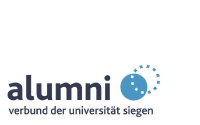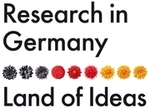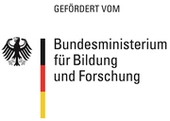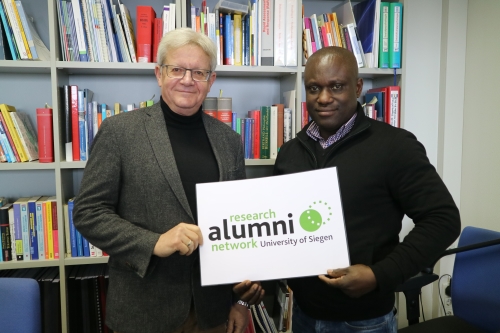- Alexander von Humbold-Stiftung prämiert Konzept zur Vernetzung der Forscher-Alumni
- Forscher-Alumni im "Querschnitt 5/2016"
- Forscher-Alumni im "Querschnitt 4/2017"
- Forscher-Alumni im "Querschnitt 1/2018"
- Forscher-Alumni im "Querschnitt 2/2018"
- Forscher-Alumni im "Querschnitt 3/2018"
- Forscher-Alumni im "Querschnitt 1/2019"
- Forscher-Alumni im "Querschnitt 2/2019"
- Forscher-Alumni im "Querschnitt 3/2019"
- Forscher-Alumni im "Querschnitt 1/2020"
- Forscher-Alumni im "Querschnitt 2/2020"
Dr. Paul Kwaku Larbi Anderson - Prof. Dr. Johannes Schädler
Building Bridges: Empowering Rural Ghana with ICT Solutions
In most rural communities in Ghana, citizens find it difficult or are even sometimes not able to access basic public services such as education and health facilities. Inadequate information communication and dissemination also limits their ability to participate in local government activities. The Nsawam-Adoagyiri and Suhum municipalities in the Eastern region of Ghana are no exception. Prof. Schädler's team is researching in these and other municipalities in Ghana on ways to integrate the rural population more into social and public life. They are looking at ways in which ICTs (Information and Communications Technologies) can be used to bridge the communication gap in rural communities in Ghana. Prof. Dr. Johannes Schädler is heading the research team, which is part of the Centre for Planning and Development of Social Services (ZPE). This highly reputed research center is engaged in the planning and development of social infrastructure on a local level. Dr. Paul Kwaku Larbi Anderson is a member of the FACIL-ICT Ghana research team.
Prof. Schädler once became aware of Ghana as supervisor of a dissertation project on the education of persons with disabilities that focused on this West African country. Through this contact, more and more researchers approached Schädler, and a lasting cooperation developed. Paul Kwaku Larbi Anderson was introduced to Prof. Dr. Johannes Schädler by Prof. Dr. Christoph Strünck, after expressing interest in pursuing Doctoral studies upon completion of a Master of Arts - M.A. ‘Roads to Democracies’ - an interdisciplinary and research-oriented master’s program integrating history, political science, and sociology from the University of Siegen. In their preliminary meeting, common linkages of research interests were identified within the ZPE framework of practical research relating to the local governance, civic participation, and inclusive communities. Remarkably, Anderson is a Ghanaian and is happy about the opportunity to enhance projects in his home country after he earned his Ph.D. in Siegen. Subsequently, this common ground opened the door for Dr. Paul Andersons and Prof. Schädler’s cooperation on the FACIL-ICT Ghana project.
In the FACIL-ICT Ghana project, they are researching how citizens, especially in rural areas of Ghana, can benefit from ICTs. They are developing ways to improve the participation of the population in rural Ghana in social life and political decision-making. New innovative public services are also being created in this international collaboration. The technologies researched are being used in the districts of Nsawam-Adoagyiri and Suhum in Ghana. These are located outside metropolitan structures and representatives turned out to be very cooperative and open to deeper collaboration. Likewise, Anderson is familiar with the different authorities in Ghana and can thus provide special insights into the country's daily life and power structures.
This allows for better understanding. The FACIL-ICT project results includes many innovative ideas and concepts such as, an interactive game currently being developed to educate young people about teenage pregnancy. In the "Amanda's Story," Ghanaian teenagers get to know Amanda, who is experiencing a teenage pregnancy. Different phases are shown, in which the players can control the course of the story in a dialogue. Each section has links to platforms where teenagers can find information. Even though this game is still in its early stages, major further developments are already being considered. There are also plans to establish a health guide in the regions mentioned. Citizens of rural regions can find contacts of regional healthcare providers here. Especially the implementation is very important. What form should this health guide take? Is it suitable to implement it in the form of a brochure? The people of rural areas should also benefit from a hybrid communication center. There are enough computers available, but the hurdles of the connection are different than in Germany. These information centers are mostly privatized and Ghana is not fully equipped with Wi-Fi. It is therefore important to examine how the use of computers in hybrid information centers can be designed most effectively. For PLWDS (People living with Disabilities), an ICT-based registration system will be created. The establishment of an information platform that provides information on health and social care issues is also part of this project.
Dr. Paul Kwaku Larbi Anderson’s research focus has been on dealing with decentralization and local government, and he examines how communication problems sometimes arise between local people and government officials in decentralized government arrangements. For example, he is looking at whether existing forms of interaction between citizens and authorities can be further developed and how contacts can be facilitated in the long term. He is happy to be part of this collaboration and thinks that the University of Siegen has established a good working relationship and relations with his home country Ghana. It has also given him the opportunity to support his country by contributing to research and development. He is always connected to his home country. This project also gives him the possibility to go to Ghana often. As long as the cooperation between the University of Ghana and the University of Siegen remains in place, Anderson would like to conduct research in Siegen.
The FACIL-ICT Ghana project and Dr. Paul Kwaku Larbi Anderson’s position are funded by Engagement Global and the State Chancellery (Staatskanzlei) Northrhine-Westfalia. The current project is scheduled to run until June 2023. Nevertheless, Prof. Schädler speaks enthusiastically of this cooperation and looks confidently to the future: "Our work is well received by the funders and there is a good prospect for extension.” As a benefit of the ZPE-Ghana cooperation the Siegen research focuses on Ghana is growing steadily with more and more project partners on both sides. Since 2022 there is even a formal cooperation of the University of Siegen with the University of Ghana, in Accra-Legon.
This article is based on an interview conducted and authored by Antonia Blumberg.






